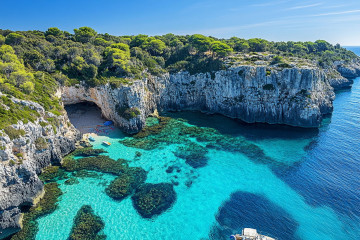Greece is more than a sunny European gem. From fascinating mythology and history to the Greek language, here are ten interesting facts about Greece.
Greece has always been one of the most beautiful countries in Europe. On top of the many stunning Greek islands with beautiful beaches that attract travelers from around the world, this sunny nation has everything one would ever want from a tourist destination. With fascinating ancient sites, delicious food, a vibrant culture, and a unique kind of architecture that cannot be found anywhere else in the world, it’s no wonder Greece is an all-around tourist favorite with its own individual characteristics that make it truly special.
In particular, one of the most beautiful islands in Greece (and indeed among the most famous) is Santorini, which has been a beloved spot for travelers due to its impressive blue and white scenery, its abundance of beaches, and the luxury Santorini hotels that promise an idyllic retreat. But Santorini isn’t the only place that intrigues travelers and beckons them to Greece. Breathtaking Greek cities and islands such as Athens, Mykonos, Corfu, Olympia, Thessaloniki, Delphi, Meteora, and almost all parts of the country have plenty of offerings travelers will love.
While a list of the best destinations in Greece is enough to make one yearn to visit this charming sunshine-soaked country, the following facts about Greece are interesting enough to make tourists fall deeply in love and excited to get on the next flight to visit!
10. Greece Is Home To The Oldest Capital City In Europe
The earliest human presence in Greece was recorded in Athens between the 11th and 7th millennia BC, which makes the city one of the oldest continuously inhabited cities in the world. Its long period of existence has made the ancient city such a historically rich place with many archeological sites and museums. This makes a visit to the city feel like stepping back in time.
9. Western Philosophy Originated In Ancient Athens
The idea of democracy, freedom of speech, and other philosophies that the Western world holds strongly were birthed in Greece. It all began in the 6th century in the Greek capital when philosophers like Socrates, Plato, and Aristotle began making sense of the world using reason rather than what Mythology taught.
As more people began seeking wisdom, they became more open-minded, and soon they created a political system in which young Athenian men were given political power to choose who would rule them. This was a huge moment in human history. It was the foundation of what people now know today as a democracy wherein adults are allowed to choose their leader themselves rather than living under the rule of dictators.
Takeaway: One key takeaway from this fact is that democracy in Athens was birthed when the people began seeking wisdom and asking questions about the world around them rather than settling for what they had been taught. This event is an inspiration and an encouragement for people today to seek wisdom, as many great things and immense changes come from doing so.
8. The Olympics Originated In Greece
The Olympics originated in Ancient Greece in a place called Olympia. According to Ancient Greek history, the event was held in honor of the Olympian god – Zeus. The first event was said to have been held in 776 BC in Olympia, and every Greek state was required to provide athletes to represent it during the games, which were held in the event. Greek states were often at war with themselves, but when it was time for the Olympics, they would agree on a truce to enable them to participate in the Olympics.
It was a unifying event for the people of Ancient Greece, but unfortunately, it was banned by the Romans in 393 AD after they conquered Greece. The idea, however, still lived as it was eventually reintroduced to Greece in the late 19th century – and then to the world after that.
Today, the event has even been split into two categories: the Winter Olympics and Summer Olympics. The Winter Olympics is aimed at revealing the winter games, while the Summer Olympics would be a time for warm weather games. Both events are held every four years.
Fascinating Fact: Only men were allowed to participate in the Olympic Games in Ancient Greece – and they did so naked!
7. Greece Is One Of The Most Mountainous Countries In Europe
While the country comes with a large coastline, it’s also filled with an abundance of mountains, making it one of the most mountainous countries in the world. The rugged landscape thus makes Greece a haven for mountain climbing and hiking.
Some of the famous mountains in Greece even play prominent roles in Greek mythology. One such mountain is Mount Olympus, which people can actually tour. This mountain, which is the highest in the country, was the home of the Olympian gods who ruled over the world, according to Greek Mythology. It has now become a major hiking destination in Greece, and the views from the peak of the mountain are utterly gorgeous.
6. Greece Has More Archeological Museums Than Any Other Country In The World
It’s understandable why Greece has more than a hundred archeological museums. It’s to protect the country’s rich ancient history and showcase it to the world. Most of these Greek museums were created to preserve the materials that were discovered from the excavations of nearby archeological sites so that they could be preserved and shown on display.
This aspect alone is enough reason to visit Greece, as it’s an opportunity to learn more about the Ancient Greek world that influenced today’s modern world.
Some of the most popular archeological museums in Greece include:
The Acropolis Museum; created to house artifacts discovered at the Acropolis.
The National Archaeological Museum; contains the most extensive collection of Greek antiquities in the world.
The Archaeological Museum of Delphi; built to house artifacts discovered from the excavation of the archeological site of Delphi – which was known as the center of the earth in Ancient Greece.
More interesting archeological museums in Greece include the Archaeological Museum of Olympia, the Museum of Prehistory in Thera, the Archaeological museum of Heraklion, the Archaeological Museum of Thessaloniki, and more. Each of these museums and those not mentioned have unique things to offer; hence, each is worth visiting when on a vacation to Greece.
5. A Lot Of English Vocabulary Originates From Greece
Many ideas in the modern world come from Greece, and one piece of evidence for that claim is the number of English words that originated from the Greek language. Tens of thousands of words that are considered English today are simply a combination of two or more Greek words. Some are even coined from Greek words or names of Ancient Greek personalities.
Some popular terms include:
Democracy; formed by combining “demos” and “Kratos”. Demos means “people”, while Kratos signifies the god of power and strength. When both words are combined, the final word can be interpreted as “power to the people”.
Europe; the continental name that was coined from the name of a beautiful mythological princess known as Europa, who was abducted by Zeus disguised as a white bull.
Hermaphrodite; the name of the son of Hermes and Aphrodite, who became joined with a nymph, and he fell deeply in love. Today, in the science world, a “Hermaphrodite” refers to the name of a species that has both male and female reproductive organs.
Marathon; The long-distance foot race that took its name from an ancient story. The story has it that Pheidippides, a Greek messenger, ran from a battlefield in Marathon to Athens to reveal the news of victory. After he revealed the victorious announcement, he collapsed and died on the spot. His legacy, however, did not die, as a long-distance race now known as a “marathon” was eventually created.
4. Greece Has Lots Of Interesting Myths
One interesting element about Greece that makes people so intrigued is that it’s where a lot of mythology originated from. Some myths from the country have even been made into movies that have inspired and entertained the whole world.
While many Greek myths are believed to be fictional, they are still interesting and enough to make one crave to visit this fascinating country. Even if not visiting the country, these myths originating from Greece are worth reading up on, as they are inspiring and can teach a lot of important lessons.
Some of the most famous Greek myths to learn about include:
The Twelve Labors of Hercules: the story of the lifelong battle between Hera and Hercules – the half-human child of her husband, Zeus.
Titanomachy: the war between Titans led by Cronus and the Gods led by Zeus.
The Naming of Athens: the story of the duel that led to the naming of the city of Athens.
3. Athens — The Greek Capital — Is Named After The Goddess Athena
The naming of Athens is one of the most famous Greek myths ever told. According to Athens history and the story of Athena, two Olympian gods – Athena and her uncle Poseidon – were interested in the most prosperous Greek city in Ancient Greece, but only one could become its patron. To become the city’s patron, each of the gods had to impress the people to get chosen over the other contender.
Poseidon offered the city a stream of seawater, which represented naval power and the assurance that the city would never know dryness. Athena, on the other hand, offered an olive tree that promised three things: oil, fruit, and wood. To the people, Athena’s gift was the most enticing, so the goddess became the patron of the city, which was also named Athens after her.
2. Greece Is One Of The World’s Largest Producers Of Olive Oil
Greece has long been one of the world’s largest producers of olives. It’s even among the top three producers in Europe and is also set to overtake Italy and become the second-largest olive oil producer on the continent. Furthermore, Greek olive oil is considered the best in the world, which is a good reason visitors to the country should buy some to take home before leaving!
Olive oil is not just a commercial product in Greece, though. It’s a product that has been a massive part of Greek culture for a long time. It’s essential to the good health of Greeks and also for the treatment of their skin and hair.
Interesting Fact: Ancient Greek Myth even claims that the first olive oil tree was planted by Athena during the contest with Poseidon over the city now known as Athens.
1. Greek Is One Of The Oldest Spoken Languages In The World
Greece boasts a very long history, and throughout, the people have been known to speak the Greek language. This has made Greek one of the oldest spoken languages in human history; it has been recorded for over 3,400 years. Such an interesting fact is worth keeping in mind, especially when heading to Greece – travelers are sure to hear a lot of Greek being spoken in the country!


